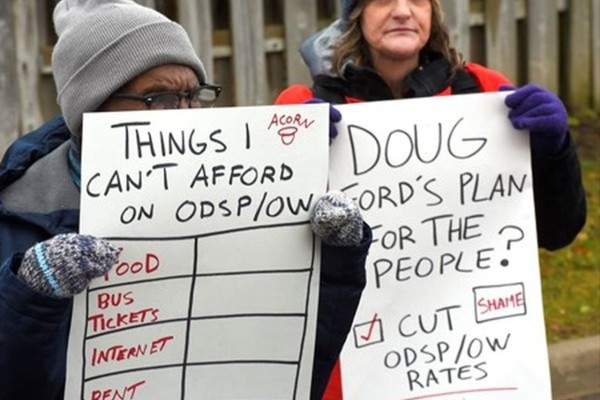Regina has a plan to end homelessness, so what’s stopping it?
The city currently has 700 vacant social housing units and 500 homeless people

Regina, Saskatchewan skyline as seen from Wascana Hill. Photo by Daniel Paquet/Wikimedia Commons.
A Regina city councillor is taking his own municipality to court.
It is not quite a man-bites-dog story but neither is it something that happens every day.
In 2018, Regina made a commitment to end homelessness. It sounded good back then, but apparently nothing much has happened to house the 488 individuals identified as experiencing homelessness in a Point-in-Time Count completed last year.
Ward 6 Councillor Dan LeBlanc calls it a “commitment that remains unfulfilled.”
Last June, along with Ward 3 Councillor Andrew Stevens, LeBlanc brought forward a motion to put in a fully costed plan to end homelessness in the city budget. The motion passed unanimously at council.
Now five months later that draft budget has come back for council’s consideration. And the item to end homelessness has gone astray—missing, like a federal pandemic grant to Ontario.
To be fair, “missing” might not be the best way to describe the omission. In fact, in the 190-page budget the word “homelessness” appears thirty times. But as far as being part of the proposed budget the homelessness funding is not proposed. In fact, Regina staff go to great lengths to explain why it is not.
LeBlanc finds this “strange.” The motion he wrote last June leaves little room for doubt. The administration was directed to include “full operational funding to solve homelessness in the 2023 proposed budget… using a housing first, supportive housing model. This draft funding [was] to be clearly demarcated in a line item of its own.”
For their part, the administration’s philosophy is that any proposed tax increase must be “reasonable and responsible.” Some may not like the idea of “containing new spending” they insist, but they (the administration) remain “excited to participate in a consensus building dialogue.”
They should contain their excitement.
“It is fundamentally undemocratic that the city manager has not followed the Council direction,” says LeBlanc. “That is both her public duty and responsibility.”
Councillor LeBlanc, who is a lawyer, Councillor Stevens and Regina citizen activist Florence Stratton have filed a mandamus order with the Court of King’s Bench seeking a judicial order that would compel the city manager to include an estimated $24.9 million to end homelessness in that proposed budget. A mandamus order from a court obligates a government official to properly fulfill their official duties.
It hardly needs to be said that the issue of homelessness is an important one for Regina and most other Canadian cities. The proposed housing first approach works according to Cole Gately, former coordinator of the Mental Health & Street Outreach Program at the City of Hamilton.
“Housing first has been widely studied. It is internationally recognized as an effective response to the homelessness crisis, and has been shown to end homelessness. Medicine Hat successfully ended homelessness using the model a few years ago,” he says.
It is a lot of money—an estimated extra $500 that each Regina household would be hit with on their property taxes next year. One can argue that ending homelessness isn’t the job of local government. That is a fair point. But what government is taking it on? Medicine Hat’s initiative is more the exception than the rule.
How will this end?
Court proceedings have been scheduled ahead of Regina’s December 14 budget meeting.
Perhaps a political compromise can be reached. That $24.9 million operating cost may be on the high side. Approximately 700 units of Regina housing stock are vacant. Taking advantage of that unused capacity could bring down the capital costs that staff estimate to be $97.6 million over two years.
It is unfortunate but perhaps not surprising that Regina’s commendable commitment to address a complex but solvable problem has bogged down.
Bob Wood has worked in social justice, community development and local government for more than 40 years. He has been a freelance writer for more than two decades. Bob lives in Port Rowan on Ontario’s beautiful south coast.










